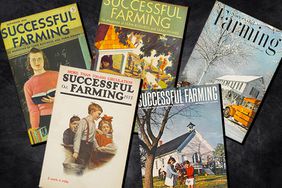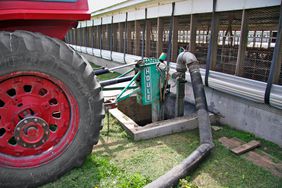:max_bytes(150000):strip_icc()/iStock-800468142-1-2000-9175ba8222054f04a9fb4ba2bff4f4da.jpg)
By Lane Wendell Fischer
Older people make up nearly half of all farmers and ranchers who die by suicide, indicating that mental-health programs may need to adapt to meet community needs, according to the author of a study on farmer and rancher suicide risks.
- READ MORE: Breaking the stigma of farmer suicides
"We focus a lot on younger generations, or the generation making decisions and contributing to the bulk of the [farm] labor" said Josie Rudolphi, PhD, assistant professor and Extension specialist at the University of Illinois Urbana-Champaign. "I think we've maybe done a disservice to some of our older generations."
Forty-five percent of farmer and rancher suicides in the past 15 years were committed by people aged 65 and older, the study found. That age group constitutes only a third of the farmer and rancher population. In the general population, people 65 and older make up 17% of suicides.
Researchers at the U.S. Department of Agriculture (USDA) and the University of Illinois Urbana-Champaign uncovered these findings by analyzing Centers for Disease Control and Prevention (CDC) violent death reporting data from 2003-2018. The data covered 40 states; 10 states that did not report data were not part of the analysis.
A number of factors could affect the disproportionate share of older farmers who commit suicide. One issue may be the loss of professional identity, Rudolphi said. For many farmers and ranchers, work becomes life. The industry, which requires long hours and hard labor, is often a family business spanning generations. Producers who step back from the profession in their older age may feel as though they are giving up their identity as well.
"[Farmers] maybe have recently retired from farming or changed their role in the operation, either of which may have taken an emotional toll on them," Rudolphi said in an interview with the Daily Yonder. "When we talk to older farmers who are stepping away from farming, many comment that they are not entirely sure what they'll do next."
Debilitating physical impairment, chronic illness, the death of a spouse, and isolation may also contribute to the higher risk of suicide for aging farmers, Rudolphi said.
Rudolphi said he hopes these findings will help spread awareness of the threat of suicide in farming communities, so people at risk can connect with the growing number of rural prevention and intervention networks.
"They don't know that we've purposefully targeted older farmers in some of our farm stress, mental health, and suicide prevention programs," Rudolphi said.
In addition to examining suicide risk factors for aging farmers, the study also found that young farmers who died by suicide were more likey to have relationship problems, while older farmers were more likely to have physical health problems.
- READ MORE: Watch for Addiction, Suicide Warning Signs
These results reveal the importance of "multi-faceted, culturally competent" intervention and prevention strategies, the researchers wrote.
Mental Health Resources
The USDA's National Institute of Food and Agriculture (NIFA) recently invested $25 million in Farm and Ranch Stress Assistance Network (FRSAN) to connect farmers and ranchers to mental health resources.
"We can't have a one-size-fits-all approach [to mental health care]," said Brent Elrod, acting associate director of programs at NIFA. "A circumstance is going to be different based upon gender, age, race and ethnicity, how long somebody's been producing."
Mental health programs must be tailored to farmers in different circumstances, Elrod said. That means listening to individuals who seek help and doing community surveys and analysis, he said.
One of the key challenges for rural suicide prevention and intervention is overcoming the fear of being judged by others for seeking help.
A little over 15% of farmers from the study had a history of suicidal thoughts and 8% had a history of suicide attempt. Comparatively, 20% of the general population that committed suicide had a history of suicidal thoughts and 18% had a history of suicide attempt, as reported by family members and others. That may indicate that farmers and ranchers experiencing mental health crises are not as likely to reach out to friends, family, or healthcare providers for help, the researchers wrote.
For neighbors and friends, the loss of a community member can be sudden and unexpected. The seemingly unpredictable nature of farmer suicide makes prevention and intervention strategies even more important, Rudolphi said.
"Suicide prevention efforts often depend on the disclosure of suicidal thoughts, which are considered an early step in the suicidal process," according to the study.
Both Rudolhpi and Elrod encourage members of farming communities to check in with their neighbors from time to time.
"We've heard anecdotally for years the rural 'pull yourself up by the bootstraps,' and that's all well and good," Elrod said. "But, in addition to that pulling up, you want to make sure that you're getting pulled up to a place where you're able to help somebody else. We have a responsibility to ensure [farmers] are supported across the gamut."
To promote mental health, communities can host local workshops through online regional networks of FRSAN. There are currently three regional projects with resource pages serving the West, North Central, and Northeast regions.
Building community capacity to identify and help is the first step, Rudolphi said.
"Farmers are so committed to their communities—they're caretakers of land, of the environment, of animals, and of their communities too" Rudolphi said. "If somebody in our community is experiencing a mental health condition, of course we should want to help. Because that's in our nature. That's who we are."
Rudolphi and Elrod said they want anyone currently experiencing symptoms of mental illness to know that they are not alone. Though it may seem like resources are expensive or far away, there are people and programs in place to help, they said.
Where to Get Help
- If you are experiencing a crisis, help is available by calling the newly established Suicide Crisis and Lifeline at 988. The old number for the Suicide Prevention Hotline, (800) 723-TALK (8255), is also still operational.
- The Rural Health Information Hub has extensive information on farmer mental health.
- Farm Aid offers links to a variety of crisis-intervention services on their website and by phone at (800) 327-6243 (800 FARM AID).
The Daily Yonder provides news, commentary, and analysis about and for rural America. You can see daily coverage at dailyyonder.com.









